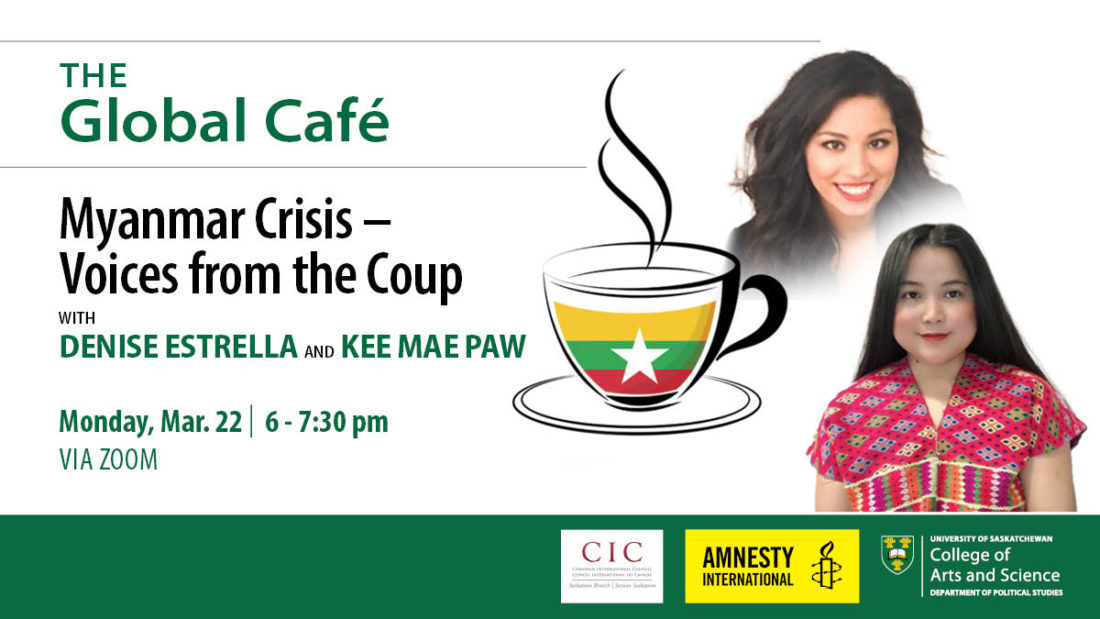
The department of political studies, an expatriate and a former refugee have brought the 2020-21 Global Café season to a close with a discussion on the Myanmar crisis.
Denise Estrella, who had been living in Myanmar as an expatriate for over three years at the time, witnessed anti-coup protests before her scheduled return to Canada this February. Upon her arrival, she reached out to her former political studies professor Martin Gaal to plan the Global Café event. They partnered with Amnesty International, the College of Arts and Science and the Saskatoon branch of the Canadian International Council to host it.
On March 22, they held the event with 66 people in attendance.
Estrella believes that it is important for undergraduate students at the University of Saskatchewan to know about the situation in Myanmar because “sometimes we become quite insular in the way that we think.”
“Being able to hear about these types of events or bring in other people from different spheres and walks of life really gives you a different type of perspective so you understand better what is going on in the world,” Estrella said.
Back in February, Myanmar’s military carried out a coup d’état, alleging that the recent landslide election win by leader Aung San Suu Kyi’s party was the result of fraud. This sparked widespread peaceful protests from civilians and the creation of the Civil Disobedience Movement. As the situation has escalated over the last two months, the death toll has surpassed 300.
During the Zoom webinar, Estrella discussed the context of the coup and the positive development she saw following the 2015 election that ended nearly 50 years of military rule in the region. She described the peaceful protests and the “lukewarm” international response that followed the coup.
Estrella reached out to Keemae Paw, a Burmese student in international studies at the University of Regina, to present with her. Paw discussed the military-led violence against ethnic minorities that forced her and her family, as members of the Karen Indigenous people, to move to Canada as refugees in 2006. She says that since the coup, attacks on ethnic groups, who have been sheltering members of the CDM, have surged.
“As I’ve said many times before, when someone asks me if I am safe now that I live in Canada, my answer is that I am physically free and safe but mentally, no. I am close to the people back in Burma, and my thoughts are always with them,” Paw said during the presentation.
Together, Estrella and Paw read out statements they received from people currently in Myanmar to tell a narrative with multiple voices.
“I have the ability to leave and look from the outside in, but there are people still there who are fighting every single day and they deserve to have their voices heard,” Estrella said.
Paw says that those who are discovered to be involved with the CDM are being attacked, emphasizing the urgent need for international help.
“It is really sad that the situation is escalating and the international community really needs to pay attention to it and do something about it,” Paw said.
Estrella and Paw hope that the event raises awareness and encourages students to take action.
“I hope that they do something — either lobbying the government, writing letters to the RCMP, writing letters to their local MP or writing letters to the government to pressure them to take further steps towards the Myanmar military and to end the suffering in Myanmar,” Paw said.
Estrella says that there are many ways to help civilians in Myanmar, including speaking out on social media or to friends and family, and organizing clothing drives.
“It’s sometimes little things that really make the most change,” Estrella said.
—
Sandra LeBlanc
Graphic: Supplied